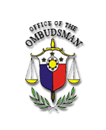Philippines
Office of the Ombudsman (OMB)

Establishment
The Office of the Ombudsman (OMB) became operational on 12 May 1988 as a Constitutional Commission. The 1987 Constitution as well as Republic Act No. 6770 (Ombudsman Act of 1989) provides for the functional and structural organization of the OMB and delineates its powers, functions and duties.
Relevant legislation
- Republic Act No. 1379, An Act Declaring Forfeiture in Favor of the State Any Property Found to have been Unlawfully Acquired by Any Public Officer or Employee and Providing for the Proceedings Therefor
- Article XI, 1987 Philippine Constitution (Accountability of Public Officers)
- Republic Act No. 6770, Ombudsman Act of 1989
- Republic Act No. 3019, Anti-graft and Corrupt Practices Act
- Republic Act No. 6713, Code of Conduct and Ethical Standards for Public Official and Employees
- Implementing Rules of RA 6713, Rules Implementing the Code of Conduct and Ethical Standards for Public Officials and Employees (Republic Act No. 6713)
- Revised Penal Code (Title II), Crime Against the Fundamental Laws of the State Revised Penal Code (Title VII)
- Republic Act 7080, An Act Defining and Penalizing the Crime of Plunder
Organization
The OMB consists of the Office of the Overall Deputy Ombudsman (ODO), the Offices of the Deputy Ombudsmen (DO) for Luzon, Visayas and Mindanao, Office of the Deputy Ombudsman for the Military and Other Law Enforcement Offices (MOLEO), and the Office of the Special Prosecutor (OSP).
The executive team of the Office of the Ombudsman consists of the Ombudsman, Overall Deputy Ombudsman, 4 Deputy Ombudsmen, and a Special Prosecutor.
Regional offices:
3 (Luzon, Visayas and Mindanao)Number of staff:
: 1,214 as of the end of 2014
Head of organization:
Ombudsman Ma. Conchita Carpio MoralesThe Ombudsman and his Deputies, including the Special Prosecutor, are appointed by the President from a list of at least 21 nominees prepared by the Judicial and Bar Council, and from a list of 3 nominees for each vacancy thereafter. The Ombudsman and his Deputies, including the Special Prosecutor, shall serve for a term of 7 years without reappointment.
Annual budget:
Php157 million (2014)Major functions:
The OMB undertakes fact-finding investigation and preliminary investigation of allegations of corrupt practices committed by public officials and employees. The Office of the Special Prosecutor (OSP) prosecutes cases before the anti-graft court known as the Sandiganbayan.
The Ombudsman holds disciplinary authority over all elective and appointive officials, except members of Congress and the Judiciary, and those officials removable only by impeachment. It conducts Lifestyle Check investigations designed to determine the existence of ill-gotten and unexplained wealth of officials and employees of the government.
The Ombudsman performs Integrity Development Review (IDR) to help agencies study and improve their own structure, systems and procedures vulnerable to corruption. It works to increase public awareness on the evils of corruption, for example, by distributing “teaching exemplars” to schools and providing training programs for the public.
It organizes the meetings of the Multi-Sectoral Anti-Corruption Council (MSACC), composed of sixteen sectors, both public and private, to synchronize projects under National Anti-Corruption Program of Action (NACPA).
Website:
ombudsman.gov.phContact:
Ms. Vilma M. Tamoria
Executive Assistant
Office of the Ombudsman
Agham Road, Diliman, Quezon City
Philippines
E-mail: vi.tamoria@gmail.com
Source: Annual Report 2014 of the Office of the Ombudsman
Last updated on 13 July 2016.
